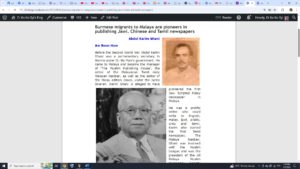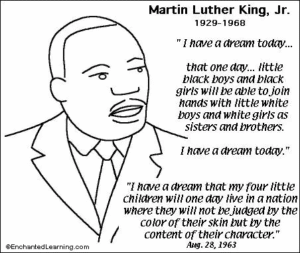Photo credit VOA
Brain Drain, Brain Gain & Brain Recirculation
As global mobility increases, the migration of professionals—scientists, engineers, IT experts, doctors—has led to both “brain drain” and “brain circulation.” Some migrants return home with new skills and global experience, benefitting their country of origin.
The list of famous migrants and descendants of migrants is long and inspiring:
- Albert Einstein (Germany to U.S.)
- Julia Gillard (UK to Australia)
- Madeleine Albright (Czechia to U.S.)
- Joseph Pulitzer (Hungary to U.S.)
- Martina Navratilova (Czechia to U.S.)
- Ang Lee (Taiwan to U.S.)
- Arnold Schwarzenegger (Austria to U.S.)
- Levi Strauss (Germany to U.S.)
- Sergey Brin (Russia to U.S., co-founder of Google)
- Deepak Chopra (India to U.S.)
- Numerous NASA astronauts who are naturalized U.S. citizens
- Leon Panetta, son of Italian immigrants, who became U.S. Secretary of Defense and CIA Director
Even today, the highest political offices in Western countries are filled by migrant descendants: Kamala Harris, Rishi Sunak, Boris Johnson, and many more. Migrants are also well-represented in cities across the U.S., UK, EU, and Australia.
As reported by Voice of America: Trump Impeachment Hearings Highlight Immigrants’ Stories, many of the key figures who testified during the hearings were migrants or the children of migrants. Their stories are the real heartbeat of democratic nations.
Mixed-Blooded Malays and Their Influence
Even in Malaysia’s ruling party, many key leaders are of mixed migrant descent:
- All six Prime Ministers of Malaysia are of mixed-blood Malay origin.
- DPM Ahmad Zahid Hamidi is a second-generation Javanese (Indonesian migrant).
- Hishammuddin Hussein is of Turkish descent.
- Shafie Apdal is Bajau.
- Ali Rustam is Bengali Malay.
- Zambry Abdul Kadir is Mamak Malay.
- Musa Aman is a mix of Malay, Pakistani, and Dusun.
- Anifah Aman (his brother) shares the same heritage.
- Azeez Abdul Rahim’s ethnicity is officially “unknown.”
- Muhyiddin Yassin’s father was Bugis and his mother Javanese.
In fact, former PM Najib once declared, “We are all Malays,” after listing dozens of ethnic roots, urging unity. Yet, some descendants of migrants now show hostility toward newer migrants.
This is the first of a series. May it inspire every migrant, mixed-race youth, and marginalized soul who has ever been told they don’t belong. The glass ceiling exists—but it can be shattered.
Read my original blogs also:
1/ Mixed blooded Malays in the ruling party
Source_The Star is NOW NOT ACCESSABLE: The many roots of Malays leave delegates in stitches
PM YAB Datuk Sri Najib had given a long list of creeds and ethnic groups ranging from Bajau to Pakistanis, Arabs and Indian Muslims who were regarded as part of the Malay root. “We are all Malays. We must be united,” he said to loud applause from the floor.
LIGHT exchanges over the origins of Malay and whether Umno vice-president Datuk Seri Hishammuddin Tun Hussein, who is of Turkish descent, could be regarded as Malay, had the delegates in stitches yesterday.
Fellow vice-president Datuk Seri Shafie Apdal had the floor in stitches earlier when he said that party president Datuk Seri Najib Tun Razak didn’t include the Turks when defining the Malays in the country during his presidential address.
Hishammuddin said that even Shafie, whom he called “the pirate of Semporna”, had eloquently presented his speech in Malay, complete with poetry. Shafie is of Bajau descent.
Hishammuddin took the joke further by labeling Umno vice-president Datuk Seri Ahmad Zahid Hamidi as Jawa Bagan Datuk, Malacca chief minister Datuk Seri Ali Rustam as Bengali Malay, Perak Mentri Besar Datuk Dr Zambri Abdul Kadir as mamak Malay, Datuk Seri Musa Aman as Malay-Pakistan-Dusun. To this, a delegate retorted he is a three-in-one Malay.
Putra Umno chief Datuk Azeez Abd Rahim was not left out.
“I have checked (with the National Registration Department) and the JPN director-general told me that Azeez’s (ethnic) status is unknown,” Hishammuddin said.
Umno deputy president Tan Sri Muhyiddin Yassin also touched on a person’s roots.
“People ask me what am I. My late father was a Bugis and my late mother was a Javanese. I am a Malay,” he said.
Najib, in his winding-up speech, declared that the man of Turkish descent and the guy with “unknown status” are also Malays.
“We are all Malays. We must be united,” he said to loud applause from the floor.
On Thursday, Najib had given a long list of creeds and ethnic groups ranging from Bajau to Pakistanis, Arabs and Indian Muslims who were regarded as part of the Malay root.
2/ Why the descendents of migrants have no sympathy but showing hatred on the new migrants? Read this news: Why the descendents of migrants have no sympathy but showing hatred on the new migrants?
See recently, although all the Singaporean Chinese were the descendents of migrants, there are a lot of animosity even on their same race Chinese Migrants.
Ferrari crash fuels Singapore anti-foreign sentiment at MY Sinchew
Singapore, May 14, 2012 (AFP) – A wealthy Chinese expatriate who crashed his million-dollar Ferrari into a taxi killing himself and two others has sparked outrage in Singapore, where anti-immigrant sentiment is on the rise. Disgruntled locals seized on the incident as another reason to attack the government’s immigration policies and the presence of more than a million foreign workers and professionals in the crowded city-state.
Foreigners are blamed for pushing up living costs, straining public transport and stealing jobs, with mainland Chinese bearing the brunt of attacks.
Hundreds of indignant comments were posted online.
“I hate to drag nationality into this tragedy but the stupidity of a single (Chinese) possibly drunkard driver has caused such catastrophic damage to so many people,” Tan Wee Meng posted on Facebook.
And few days ago, a Pakistani-Malay mixed blooded Foreign Minister even advised the OIC leaders to push out the refugees But ofcourse, he used the the very sweet sentence of day dreaming: voluntary repatriation and re-integration of returnees are practical solutions to the problem of refugees facing the Muslim world.
Even if ALL GREAT OIC countries or US President or UNSG try, they would not be successful to push the Palestine Refugees into Israel or Gaza strip. Even if Israel PM agree to accept, he would face the fate of Yitzhak Rabin.
The assassination of Yitzhak Rabin took place on November 4, 1995 (12th of Marcheshvan, 5756 on the Hebrew Calendar) at 21:30, at the end of a rally in support of the Oslo Accords at the Kings of Israel Square in Tel Aviv. The assassin, a far-right-wing religious Zionist named Yigal Amir, strenuously opposed Rabin’s peace initiative and particularly the signing of the Oslo Accords. (Wikipedia )
Now read this The real answer to refugee woes from the StarOnline
KUALA LUMPUR: Malaysia feels voluntary repatriation and re-integration of returnees are practical solutions to the problem of refugees facing the Muslim world.
Foreign Minister Datuk Seri Anifah Aman said countries in the Organisation of Islamic Cooperation (OIC) should work together and assist each other to address this issue.
“The strategies and methods to create a safe and conducive environment for the return of refugees are steps that OIC countries should discuss expeditiously,” he said during the OIC International Conference on Refugees in the Muslim World in Ashgabat, Turkmenistan.
3/ Why do people hate migrants?
4/ We are migrants and mixed blooded people, so what?
5/ Malaysia failed to appreciate the value of the professional migrants and foreign workers
6/ Trump Impeachment Hearings Highlight Immigrants’ Stories
One came from northeast England. Another came from the former Soviet Union. A third was born in Canada to parents who’d fled the Soviet Union and Nazi Germany.
Several witnesses who testified in the House impeachment inquiry this week chose to highlight their immigrant backgrounds, sharing their families’ stories in highly personal opening statements. They drew a connection to how those experiences led them to public service and a strong desire to safeguard U.S. national security.
Their stories offered a sharp counterpoint to President Donald Trump, who has often derided immigrants as a threat to American national security.
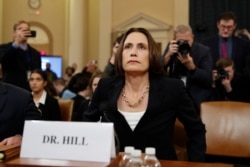
“I can say with confidence that this country has offered for me opportunities I never would have had in England,” former National Security Council official Fiona Hill testified Thursday. She spoke in what she called a “very distinctive working-class” British accent that would have impeded her professional advancement at home, but that “never set me back in America.”
On Tuesday, Lt. Col. Alexander Vindman, an Army officer who works with the National Security Council, testified that his family fled to the U.S. from the Soviet Union when he was 3. He said in his opening statement that he and his brothers felt compelled to serve in the military to repay the country that had offered them refuge from authoritarian oppression.
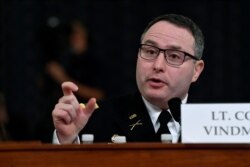
“In Russia, my act of expressing concern to the chain of command in an official and private channel would have severe personal and professional repercussions, and offering public testimony involving the president would surely cost me my life,” he told the committee. He expressed gratitude for his “father’s brave act of hope 40 years ago and for the privilege of being an American citizen and public servant, where I can live free, free of fear for mine and my family’s safety.”
“Dad, I am sitting here today in the U.S. Capitol, talking to our elected professionals. Talking to our elected professionals is proof that you made the right decision 40 years ago,” he added, assuring his father: “Do not worry. I will be fine.”
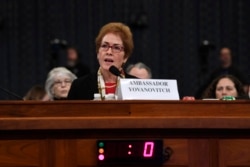
It was a similar story for Marie Yovanovitch, the former ambassador to Ukraine, who immigrated to the U.S. at age 3 from Canada. Her father had fled the Soviets, while her mother had grown up in Nazi Germany.
“Their personal histories, my personal history gave me both deep gratitude towards the United States and great empathy for others like the Ukrainian people who want to be free,” she told lawmakers, explaining that she joined the foreign service with “no agenda other than to pursue our stated foreign policy goals.”
“My service is an expression of gratitude for all that this country has given to me and to my family,” she said.
Another witness, Gordon Sondland, the president’s ambassador to the European Union, described how his parents had fled Europe during the Holocaust, first moving to Uruguay and then settling in Seattle.
“Like so many immigrants, my family was eager for freedom and hungry for opportunity,” he said.
House Intelligence Committee Chairman Adam Schiff, D-Calif., said after listening to Hill’s opening statement that her story about fulfilling her father’s dream of one day moving to America reminded him of Vindman’s.
“The few immigrant stories that we have heard just in the course of these hearings are among the most powerful I think I’ve ever heard,” Schiff said Thursday. “You and Colonel Vindman and others are the best of this country and you came here by choice. And we are so blessed that you did, so welcome.”
Questioning loyalties
Yet those immigrant roots also opened several witnesses to criticism. Republican members, for instance, raised the fact that Vindman, who appeared in his uniform, had been repeatedly offered the position of defense minister by the government of Ukraine. He reported the offers to his superiors and quickly dismissed them.
“I guess Mr. Castor is implying maybe you have got some dual loyalty, which is, of course, an old smear we have heard many times in our history,” Rep. Sean Maloney, D-N.Y. said at one point, referring to Steve Castor, the committee’s Republican attorney.
Rep. Jim Himes, D-Conn., said the line of questioning “may have come cloaked in a Brooks Brothers suit and in parliamentary language,” but was “designed exclusively to give the right-wing media an opening to question your loyalties.”
Hill was also asked about the attacks on Vindman and suggestions of dual loyalty.
“I think it’s very unfortunate,” she said, describing the country’s immigrant history as “the essence of America.”
With the exception of very few, she added: “Everyone immigrated to the United States at some time in their family history. And this is what, for me, really does make America great.”





